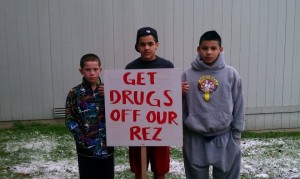This summer a number of tribes, including the Standing Rock Sioux Tribe of South Dakota, Spirit Lake Tribe of North Dakota, and Blackfeet Tribe of Montana, have resuscitated the penal tradition of banishment to eradicate member drug dealers from their lands and to deter others from selling drugs there.
As Ryan Dreveskracht and I explain in our recent law review article:
Banishment of the individual was only considered as a last resort, if familial and community penal efforts failed, and reserved for serious crimes . . . In order to effect banishment as a punishment, a consensus of the community was generally required . . . Yet given indigenous notions of belonging, even a banished person was typically allowed to return to the community conditionally after serving his or her time away.
Banishment, therefore, stands in stark contrast to disenrollment, a practice foisted upon tribal governments by the federal government for assimilationist reasons, whereby a tribal citizen is permanently jettisoned from the tribal community. Disenrollment almost always lacks a consensus of the community.
While the above-mentioned tribes have wisely stopped short of meting out disenrollment as a punishment of members for drug dealing crimes, the Cheyenne River Sioux Tribe rather curiously resolved to not only banish for life but also disenroll member dealers. Does Cheyenne River fully appreciate the implications?
I ask because the Lakota-based Last Real Indians recently explained: "We know of no Lakota word for 'disenrollment.' . . . We know of no Sioux leaders who have ever disenrolled our relatives from the Great Sioux Nation." So it seems that Cheyenne River has resorted to colonial---rather than traditional Lakota---penal modes. That is certainly the Tribe's prerogative but perhaps the Tribal Council is misguided.
Disenrollment is not a punishment that fits even the most heinous crime. Indeed, even the most horrid drug dealers in non-tribal society are not divested of their American citizenship and identity when convicted for drug dealing. The 14th Amendment to the U.S. Constitution prohibits it.
Provided that due process protections attach to the liberty and property interests at bar, the tradition of banishment can and should be used to rid tribal communities of member drug peddlers---yet sparingly, in keeping with the tradition. Disenrollment, though, is and should never be the approach.
Gabriel S. Galanda is the managing partner of Galanda Broadman, PLLC, in Seattle. Gabe is a descendant of the Nomlaki and Concow Tribes, belonging to the Round Valley Indian Tribes of Northern California.





